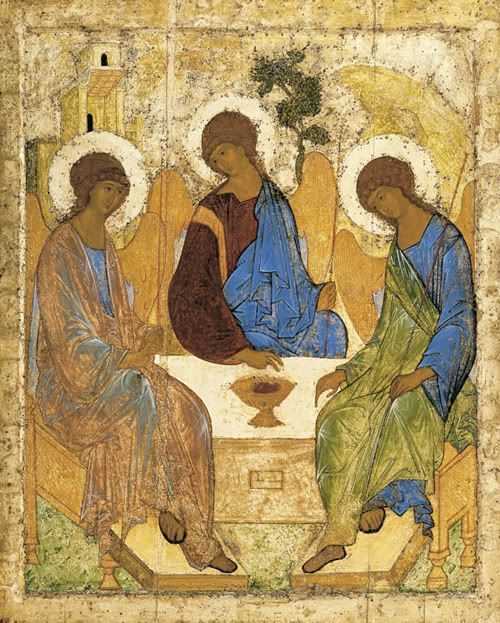|
|
|
|
 Editorial Editorial  |  | | |
 The altar call is a hallmark of the prototypical Adventist
worship service. In a significant departure from most of Christian history,
Adventist liturgy does not generally culminate with the Lord's Supper and
dismissal but, rather, with an appeal. The altar call is a hallmark of the prototypical Adventist
worship service. In a significant departure from most of Christian history,
Adventist liturgy does not generally culminate with the Lord's Supper and
dismissal but, rather, with an appeal.
The reasons for this phenomenon are fairly easy to identify.
Like many other North American Protestants, Adventists trace their liturgical
roots to the camp meeting revivals and evangelistic meetings of the
mid-Nineteenth Century. The first Adventists, a collection of Christians from
various denominational backgrounds, had no common ritual tradition apart from
the evangelistic meetings through which they joined the Adventist movement. As
a result, early Adventists designed worship to emulate the primary religious service
associated with their faith and emerging community - camp meeting evangelism.
Various factors have contributed to the shape and ethos of
Adventist worship over time, but most liturgical changes have been merely
adaptations of an evangelistically structured core. Liturgical scholars refer
to such a ritual pattern as "frontier worship": preliminaries leading up to a sermonand culminating with an appeal - basically,
the structure of a typical nineteenth-century evangelistic meeting.
Although this uniquely American pattern of worship grew out
of a need to evangelize the western frontier (i.e., Indiana), its staying power
is grounded in two factors. First, "frontier worship" resonates with our sense
of evangelistic mission. And second, it is easily adaptable to many worship
styles (e.g., the "seeker services" pioneered by Willow Creek Community Church).
So-called "contemporary" and "traditional" services may have vastly different
music but are often nearly identical in their underlying architecture and
evangelistic function.
The ubiquity of this "frontier worship" model raises a number
of important questions: Although evangelism is certainly compatible with
worship, is it a sufficient way to understand what worship is all about? Given
that the Lord's Supper is one of Jesus' few explicit liturgical instructions, how
can we account for its infrequent celebration in most Adventist congregations?
Does the "frontier worship" structure of many Adventist services emphasize the
importance of our decision for Christ
over God's decision to save us
through Christ? Can evangelistic worship overly focus on us instead of God? How
might other theological understandings of worship (encountering God's presence,
rehearsing God's story, corporate prayer, human response to Divine revelation)
complement our traditional focus on evangelism?
As you read the articles below, I invite you to bear these
questions in mind and share your thoughts with us.
 Discuss this article on Facebook Discuss this article on Facebook
| |
 Worship Theology Worship Theology  |  | | |
 Editor's
note: The following is an excerpt from "Heavenly Worship: The Biblical Vision,"
which can be downloaded here. Editor's
note: The following is an excerpt from "Heavenly Worship: The Biblical Vision,"
which can be downloaded here.
A
third dimension of the vision of God (or theophany) in worship is the encounter
with divine holiness. In the heavenly worship scene of Isaiah 6, the seraphim
adore His character, but note the character trait that is paramount in their
antiphonal praise: "Holy, Holy, Holy is
the Lord of Hosts!" God's fundamental attribute is holiness; the seraphim
repeat "Holy" three times, a Hebrew method of expressing the superlative. Some
may wonder if Isaiah in vision entered the heavenly worship during one of many
stanzas extolling various attributes of God's character, and happened to hear
the stanza about God's holiness. However, when we compare Revelation 4:8, the
New Testament companion passage depicting heavenly worship, the four living
creatures are still singing "Holy, Holy, Holy!" There is no threefold
repetition of -"love, love, love," or "goodness, goodness, goodness" in the
Bible. To be sure, the Bible emphasizes love and goodness, but it is "holy
love" and "holy goodness." In Scripture holiness "embraces every distinctive
attribute" and is "the outshining of all that God is...in His self-manifestation
all the attributes of God come together and blend into holiness."[1]
In Psalm 99:3, 5, 9, again we find the threefold call "Holy is He!" as the
ground of worship.
In
the passage we noted earlier in discussing beauty in worship, Ps 96:6, the
aspect of holiness in worship is also mentioned: "Worship the Lord in the
beauty of Holiness." The foundational
appeal of both Old Testament and New is "Be holy, for I am holy!"[2]
"Holiness is the foundation of God's throne."[3] In churches
where there is great emphasis upon God's love, it seems that God's holiness is
often all but forgotten. In the desire to bask in the acceptance of God's love,
there is a neglect to realize that first must come a sense of the contrast
between an infinitely pure and holy God and our impurity, sinfulness and
finitude.
"Holiness"
(qadosh) in Hebrew has a primary
meaning of "separation." God is the absolutely unique One, separate in His
transcendence ("beyond or without limits"). He is the one "Wholly Other." The
holiness of God reveals itself in an expression of His majesty and awesome
grandeur; He is the One who "dwells in unapproachable light, Whom no man has
seen or can see" (1 Tim 6:16; cf. Exod 34:20-23).
In
the vision of worship in the heavenly sanctuary, Isaiah "was overwhelmed with a
sense of the purity and holiness of God."[4] Once Isaiah
caught this vision of God's holiness, it never left him. His favorite phrase
for God became the "Holy one of Israel" (24 times in Isaiah). Isaiah's
experience in worship needs to be ours.[5] Before we
worship God as our intimate friend, we must first catch a glimpse of Him in His
infinite holiness. I believe this is the most fundamental point in worship; it
is our great need today, the most important way to revitalize our worship experience.
In a secular age when nothing is regarded as holy, we must recapture the sense
of the transcendent, holy God. All else in worship will spontaneously flow from
an encounter with God in His infinite holiness.
---
[1] R.
A. Finlayson, "Holiness, Holy Saints," in New
Bible Dictionary, ed. J. D. Douglas (Grand Rapids, MI: Eerdmans, 1962),
530.
[2] Lev
11:44, 45; 19:2, 45; 20:7, 26; 21:8, 32; 1 Pet 1:16.
[3] White, Testimonies to Ministers, 145.
[4] White,
Prophets and Kings, 307.
[5] Note
that in Jewish Synagogue worship, the Amidah (18 Blessings)
which comes early in the service, emphasizes the foundational character of
God's holiness. In the Christian church, God's holiness is also underscored as
foundational to worship (see Rev 4:8).
| |
 Communion Communion  |  | | |

What does it mean to offer hospitality
to God?
One of the great works of religious art
is Andrei Rublev's icon The Trinity (see below). Beautifully written in this
icon are God and two angels seated around a table, a shared meal between them,
and their feet unshod and ready to be washed. Rublev saw this scene from
Genesis 18 as an example of the Trinity, God's nature being one of perfect
communion, love and service. He even hints at this eucharistic relationship by
hiding a chalice in the negative space between the three beings around the
table.
Rublev was inspired by Genesis 18:1-8.
Abraham has been dwelling under the Oaks of Mamre when he sees three people,
the LORD and two angels, pass by. He calls out, inviting God to stay and
stretch out under the oak tree where the trio are offered water to wash their
feet and some bread to eat. Abraham then quickly rushes off to prepare a lavish
feast for God.
Here Abraham offers hospitality to God
around a shared table. The washing of feet and breaking of bread should bring
to mind our own practices around a shared table and shared basins. When has God
come by us and we've invited God into our dwelling places? When we do make that
invitation, when we meet God around the table and offer Him a place to rest, in
return God shares His plans and concerns, just as God shared His plans
regarding Sodom and Gomorrah with Abraham (Gen 18:16-22).
From this place of hospitality and
intimacy with God, we hear His heart, His plans, and we respond alongside
Abraham with bold intercession, calls to justice, and seeking forgiveness (Gen
18:23-33). To offer hospitality to God is to join God at the communion table,
to remember Christ's finished work of salvation, and to partner with the
Trinity in building the Kingdom for the sake of the world.
The next time you see God pass by, won't
you offer Him a little water, some bread, and some shade?

| |
 Sensory Worship Sensory Worship 
|  | | |

In her new book, "Remembering
Smell," Bonnie Blodgett writes about her experience and about the science
of smell. Bonnie lost her sense of smell completely. She says: "I had no way of
knowing before what it would be like to not smell anything. And when I woke up
and sniffed and there was nothing there, I just - I don't know how to explain
it. I felt completely disconnected. I truly felt as if colors were more flat.
The voices in conversation felt like a TV soundtrack to me, and I think it's
really because I was disconnected...they create part of the world that we live
in. So that emptiness, that sterile landscape was quite a shock."
As I listened to Bonnie describe
her experience on the radio show All
Things Considered I wondered if perhaps we have forced our worshippers to
go through the same experience-eliminating fragrance from our sensory worship
menu. In most churches worship depends mostly on audio, and now with the ubiquitous
video projector we have visual worship, but what about fragrance? (Continued on Facebook)
 Continue this article on Facebook Continue this article on Facebook
| |
 Worship Planning Worship Planning  |  | | |
I must confess my ambivalence about traditional altar calls
and their potential to be emotionally manipulative. But for better or worse,
they are an integral aspect of many Adventist worship services. Moreover, they
are not only rooted in our liturgical tradition (as discussed above) but
are also one manifestation of a call to commitment - an important aspect of the
Bible's vision of worship (see Richard Davidson's reflection on Isaiah 6:1-8, entitled "Heavenly Worship: The Biblical Vision").
Congregational worship should certainly involve a call to
action in response to our encounter with God. Here are two specific ways to re-imagine
the traditional closing appeal:
1. Consider new ways that worshipers can respond other than
coming forward or filling out cards. One possibility, especially when speaking
to young people, is to give a number to which worshipers can text a response or
question. For those whose mobile phones are not an extension of their arms,
texting may fail to convey the gravity of some decisions. This is a valid concern. Moreover, there are real benefits to "unplugging" during worship. One advantage of texting, however, is that it allows for a wider range
of responses and questions than the typical binary options presented (i.e., yes
or no). It may not be the best way to call for baptism, but it could be a great
means of continuing a dialogue with people at different places in their walk
with God.
2. Broaden closing appeals to more fully reflect God's
priorities. In what is perhaps God's most scathing rebuke of false worship, God
condemns Israel's lack of concern for the most needy, vulnerable members of
society (See Isaiah 1:11-17). Why not have an altar call aimed at enlisting
volunteers for the local homeless shelter or Habitat for Humanity project? If the parable of the Sheep and the Goats (Matt 25:31-46) is
any indication of God's expectations, perhaps we should think beyond inviting
people to merely believe. Early Christian worship is instructive on this point:
a central act of worship was bringing food from home to both be used in
communion and feed the poor. A
rediscovery of such an integral connection between worship and social justice
would greatly benefit both our worship gatherings and the wider communities in
which they take place.
| |
 Worship and Prayer Worship and Prayer  |  | | |

Prayer is Seeking God's Presence
How do you view prayer in general? What is the purpose of prayer? Is it
simply to draw up one's list of requests, petitions and problems and present
them in an acceptable fashion to God? God doesn't instruct us to pray without
ceasing just so He can be the genie that fulfills all of our wants and needs. The purpose of prayer goes deeper than that. Prayer is a way to
maintain constant and meaningful communion with God. Prayer is about knowing
God, worshiping Him, loving Him, adoring Him, and having a deep, passionate and
intense relationship with Him. Prayer is being aware of God, aware of the
presence of God, aware of His activities, aware of His grace, aware of
everything that has to do with our Heavenly Father. Prayer is about glorifying God by demonstrating utter dependence on
Him. It is about experiencing God's presence, forgiveness, power, wisdom, joy,
love, compassion, and confidence together. Let's look more
closely at prayer and its role in worship. (Continued on Facebook)  Continue this article on Facebook |
|
 Worship Gatherings Worship Gatherings  |  | | |
GODencounters DC/Baltimore Metro
GODEncounters DC Metro will include young adult worship on Friday, October 8, 8:00 p.m. held at New Hope Church, 12350 Hall Shop Road, Fulton, MD 20759. Matthew Gamble will be the speaker, Rick Anderson will lead the worship, and Sky Solo will be featured at the GODEncounters Café. For more information, click here. | |
 Worship Resources from the NAD Church Resource Center Worship Resources from the NAD Church Resource Center  |  | | |

Children's Church Resource
Many churches are discovering that a strong Children's Church can bring renewed vitality to the worship experience. Whether occasional, or every week, children's church can provide an extremely relevant church service for kids. As a result the kids experience the joy of worship and become a primary force in drawing their parents back to church week after week. But how do you get a Children's Church up and running? The NAD Church Resource Center has recently help fund the development of the Quick Start Guide to Children's Church. This guide is full of important
information to help you start or revitalize a ministry at your local
church. This guide contains a job description, instructions for getting
started, tips for maintaining a successful ministry, recommended resources and more. Whether you're new to this
ministry or a seasoned volunteer, this Quick Start Guide will inspire
you with lots of great ideas you can immediately put to use in your
local church.
You can purchase the guide for $2.95 from AdventSource. | |
 To the Point To the Point  |  | | |
"The principle thing about worship is
that God is glorified; and it's impossible for God to be glorified and you and
I not to be edified."
-Carlton Byrd
"Though
Jesus knew Judas from the beginning, He washed his feet. And the betrayer was
privileged to unite with Christ in partaking of the sacrament...It was because the disciples were erring and
faulty that He washed their feet, and all but one of the twelve were thus
brought to repentance. Christ's example forbids exclusiveness
at the Lord's Supper."
-Ellen
G. White, The Desire of Ages, 655-656
"We
are often so caught up in our activities that we tend to worship our work, work
at our play, and play at our worship."
-Charles
Swindoll
| |
 Publishing Information Publishing Information |  | | | Best Practices for Adventist Worship is a Vervent publication of the NAD Church Resource Center. Editor: Nicholas Zork (email). You may republish pieces from Best Practices in your own newsletter or blog, with attribution to the Best Practices for Adventist Worship newsletter and the author. Permission should also be secured from the author.
We welcome your feedback and ideas.
| |
|
|
|
|
|
|